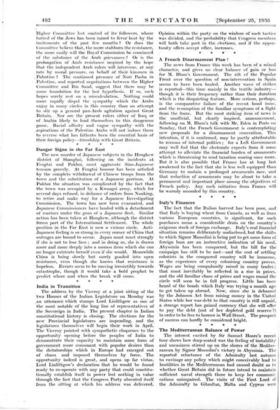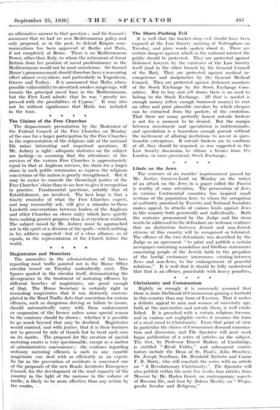The Mediterranean Balance of Power The interest excited by Sir
Samuel Hoare's recent tour shows how deep-seated was the feeling of instability and uneasiness stirred up on the shores of the Mediter- ranean by Signor Mussolini's victory in Abyssinia. The reported reluctance of the Admiralty last autumn to envisage any policy which might conceivably lead to hostilities in the Mediterranean had caused doubt as to whether Great Britain did in future intend to maintain sufficient naval strength there to keep her communi- cations unimpaired. The visits of the First Lord of the Admiralty to Gibraltar, Malta and Cyprus were an affirmative answer to that question ; and Sir Samuel's assurance that we had no new Mediterranean_ policy_and only proposed, as in the past, to defend _Empire com- munications has been approved at Berlin and Paris, if not completely at Rome. There is no Mediterranean Power, other than Italy, to whom the retirement of Great Britain from her position of naval predominance in the Mediterranean would not be most unwelcome. Sir Samuel Hoare's pronounceinent, should therefore have a reassuring effect almost everywhere, and particularly in Yugoslavia, Greece and Turkey. It is announced that Malta, whose pOsaible vulnerability to air-attack awakes misgivings, will remain the principal naval base in the Mediterranean, btit the First Lord admits that he was " greatly im- pressed with the possibilities of Cyprus." It may also not be without significance that Haifa was included in the tour.



















































 Previous page
Previous page